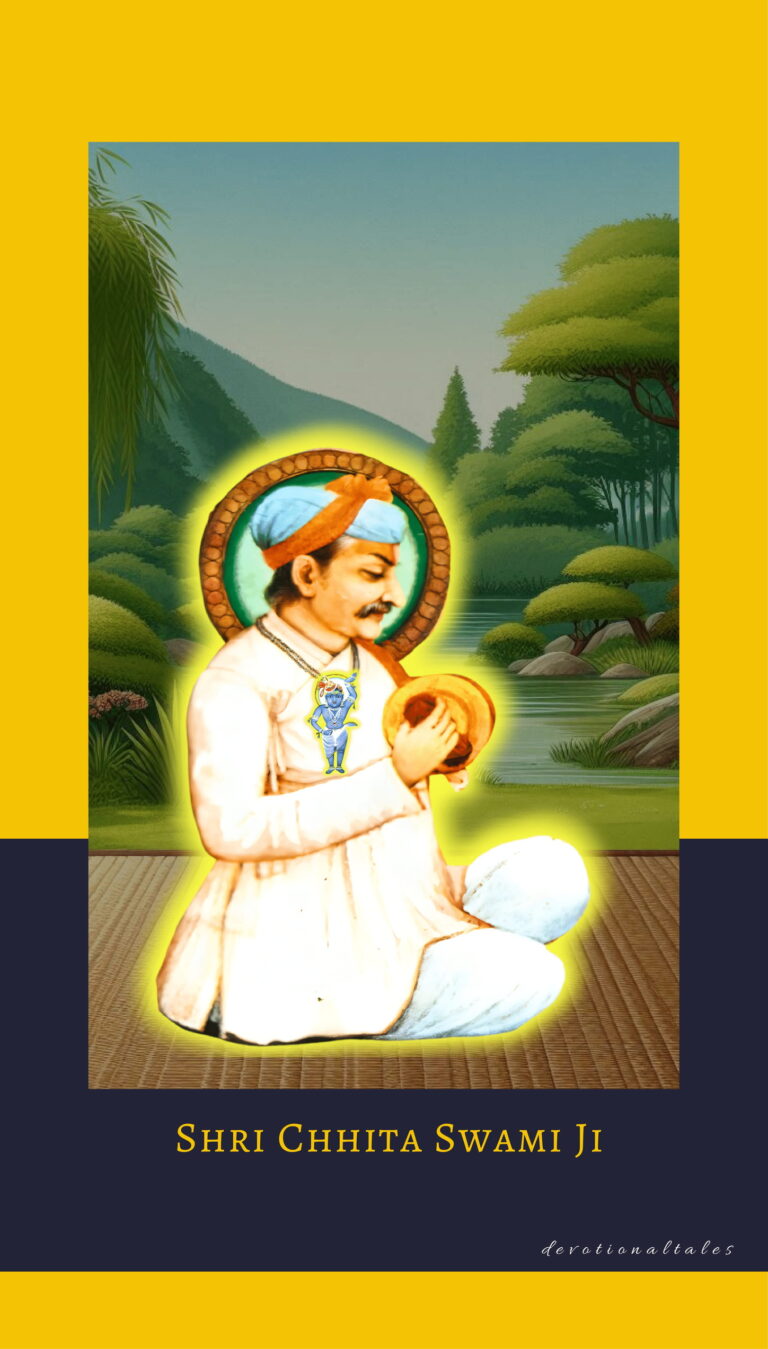
Shri Chhita Swami Ji (Asht-Sakha)
A Life Devoted to Shrinathji
In the sacred town of Mathura, a divine soul took birth in the respected Chaubey family. The year was 1515, and this child would grow to become one of the most cherished companions of Lord Shrinathji. His name was Shri Chhita Swami—a name forever etched in the hearts of those who follow the path of devotion.
Shri Chhita Swami was one of the eight Sakhas (friends) of Shrinathji and was one of the Ashtachap saints in Pushtimarg.
But what made Shri Chhita Swami truly special was the divine friendship he shared with Shrinathji.
As time passed, Shri Chhita Swami sought spiritual shelter at the lotus feet of Gusain Shri Vitthalnath Ji, the great son of the great Mahaprabhu Shri Vallabhacharya, founder of Pushtimarg.
He poured his heart into singing padas—devotional poems—for Shrinathji.
Each verse carried the fragrance of unconditional love, eternal friendship, and deep longing. His words were the echoes of a soul calling out to the divine.
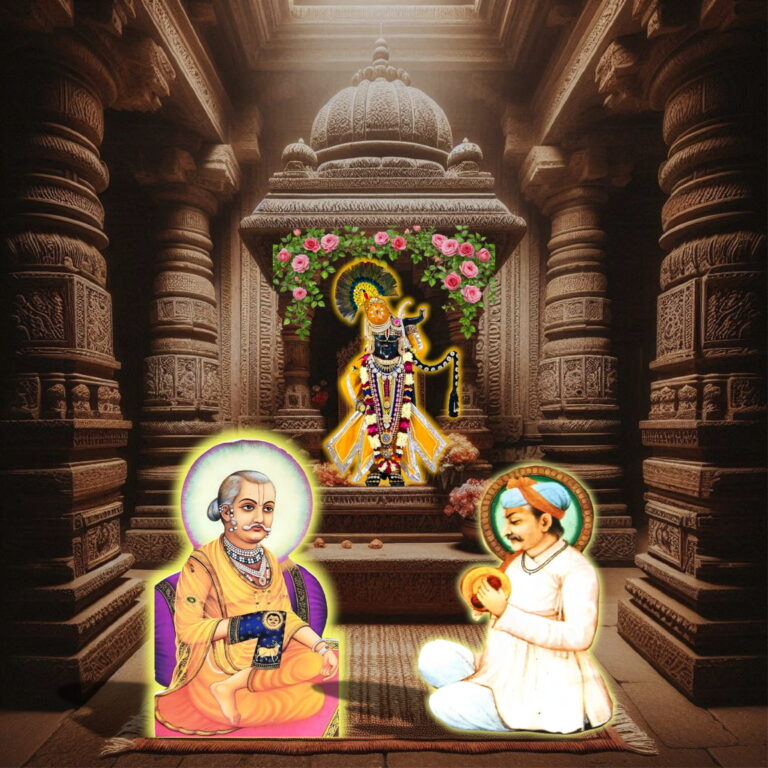
Past Life (before initiation) as "Chhitu Chobe" of Shri Chhita Swami
Long before he became known as the saintly Shri Chhita Swami, he lived a very different life—as Chhitu Chobe, the feared leader of a gang of five notorious goons in Mathura.
Their den was set near the sacred Vishram Ghat, and the mere mention of their names brought fear into the hearts of the townsfolk. Ruthless and reckless, they ruled the streets with terror.
At that time, a divine presence had come in nearby Gokul — Gusain Shri Vitthalnath Ji.
Word spread among people:
“A miraculous saint has arrived in Gokul. Those who merely look upon him are transformed forever.”
The five goons, hearing of this, decided to test Shri Gusain Ji. And Chhitu Chobe, took it upon himself to lead the plan.
He boarded a boat to Gokul, carrying with him a fake coin and a dried coconut, intending to mock the saint with his tricks.
The moment Chhitu Chobe stepped into Shri Gusainji’s bethak, something within him shattered. Every illusion he held, every layer of arrogance, melted away. “This is no ordinary man,” he thought in wonder, “This is God Himself.”
He was ashamed that I had come out to test God.
But Shri Gusainji, radiant with love, welcomed him with open arms,
“Come, Chhita Swami, sit down,” he said kindly.
That one word—”Chhita Swami”—struck Chhitu Chobe. It wasn’t just a name; it was a rebirth.
Then, with a gentle smile, Shri Gusainji asked,
“Won’t you give me the coin and coconut you’ve brought as a gift?”
Humbled and speechless, Chhitu Chobe handed them over.
Gusainji gave the fake coin to one of his servants. Another servant broke the dried coconut—and from within, came fresh white pulp and sweet water, as if it had never dried at all.
Overwhelmed, Chhitu Chobe thought to himself,
“I came with deceit in my heart and worthless offerings in my hands. Yet here I have found the Supreme, the Guru, the God I never knew I was seeking.”
He fell at Shri Gusainji’s lotus feet. He had found his true path, and he would never leave it again.
That very moment, from the depths of his transformed heart, he composed his first divine Pada (devotional verse) in Raag Nat:
“Bhayi Ab Giridhar So Pahichaan.
(Hon) Kapat Roop Dhari Chhalve Aayo, Purushottam Nahin Jaan.
Chhoto Bado Kachhu Nahin Jaanyo, Chhaye Rahyo Agyan.
Chhitaswami Dekhat Apanayo, Shri Vitthal Kripanidhan.”
Shri Gusainji was deeply pleased by this spontaneous expression of devotion.
That very night, Chhita Swami Ji slept there, and the next morning, he was formally initiated through the Brahmasambandh, the sacred diksha (mantra initiation).
And then it happened—he had the divine vision of the Lord. The leelas (pastimes) of the Supreme unfolded in his heart like a grand revelation. In that instant, he became utterly convinced that Shri Gusainji and the Lord were not separate—they were the same.
Soon after, Chhita Swami Ji journeyed to Govardhan for darshan of Shrinathji. As he stepped into the temple, his eyes widened in wonder—Shri Gusainji was seated inside.
He bowed down, completed his darshan, and upon exiting, asked the devotees,
“When did Gusainji come here?”
They replied,
“Shri Gusainji is now in Gokul.”
Shocked and stunned, Chhita Swami Ji rushed back to Gokul—and there, once again, he saw Shri Gusainji sitting calmly, as if he had never left.
That moment confirmed the deepest truth in his heart:
“Shrinathji and Shri Gusainji are one.”
From then on, Chhita Swami Ji composed many padas, referring lovingly to the Lord as “Giridharan Shri Vitthal”—a single name for his Guru and God.
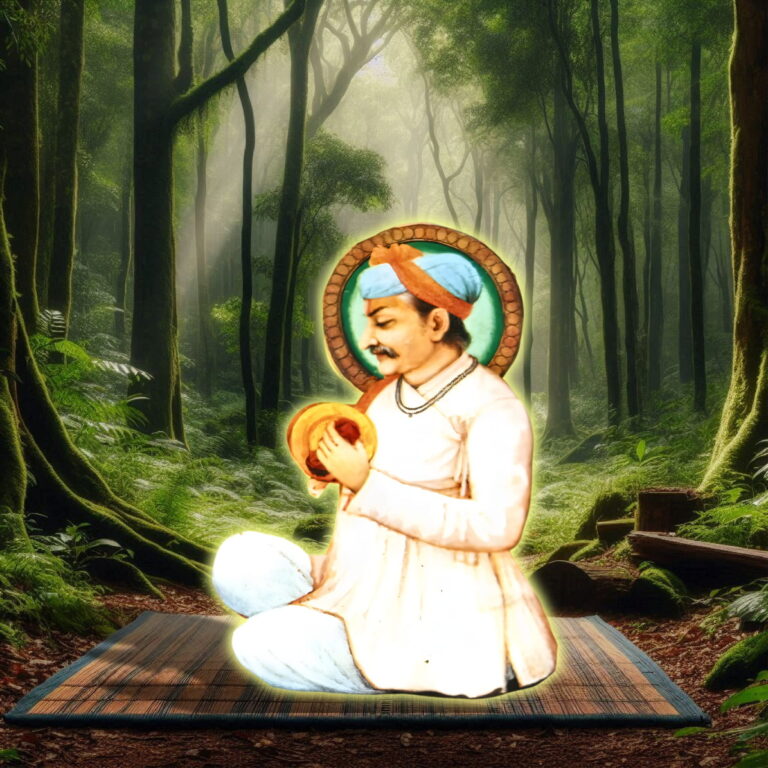
Chhita Swami Ji’s Bold Stand
Chhita Swami Ji was once the priest of Birbal, the famous minister in Emperor Akbar’s court. One time, Chhita Swami Ji went to Agra to collect the annual donation (Varsondhi) from Birbal and stayed with him.
Early one morning, as Chhita Swami Ji woke up, he remembered Mahaprabhu Shri Vallabhacharya Ji’s name and began to sing a beautiful devotional verse in Raag Devgandhar:
“Shri Vallabh Rajkumar.
Nahin Miti Nath Kahaan Lon Baranon, Aganit Gun-Gan-Saar.
‘Chhitaswami’ Giridhar Shri Vitthal Praghat Krishn Autar.”
Birbal heard the verse. He was amazed by Chhita Swami Ji’s musical talent and devotion, but also started to worry. He thought,
“What if Emperor Akbar hears this? What will he think?”
Later, Chhita Swami Ji left the bed, went to the sacred Shri Yamuna Ji (River), and took a holy bath.
He returned, woke up his Shri Thakurji, did his seva (daily service), and offered food to the Lord. Then, once again, he began to sing another devotional verse:
“Je Vasudev Kiye Puran Tap Soi Fal Falit Shri Vallabhdeh”
Birbal heard this devotional verse and politely said to Chhita Swami Ji,
“You sang devotional verses in the morning, and now again, if the Mleccha king hears this, and asks me questions, what will I say? It’s better if you do not do it.”
Hearing this, Chhita Swami Ji was deeply hurt. He replied calmly but firmly,
“If that Mleccha king asks me, I will answer him directly. But right now, it is you who are stopping me, so you too are like a ‘Mlechha’ (an outsider to the path of devotion). From this moment, I will never look at your face again.”
Chhita Swami Ji packed up his things, left the donation behind, and returned to Mathura, without saying another word.
When Emperor Akbar heard about this, he asked Birbal,
“Why is your priest angry with you?”
Birbal explained everything.
Akbar then said, “Brahmins often get upset over small matters.” But after a moment, he shared a personal experience:
“Once, when we were on a boat, a saint named Dixit Ji blessed me. In return, I gave him a priceless gem that produced 50 grams of gold every day. But he threw that gem into the Yamuna River. I was furious and demanded that gem again. Then, he put his hand into the Yamuna waters and pulled out a handful of divine jewels. He asked me to pick which one was mine! I realized then that this was no ordinary man—he was divine. So, I now understand that your priest was right and why he reacted the way he did. You should have thought more carefully.”
Birbal was shocked and said nothing more.
When Shri Gusain Ji heard what had happened, he turned to some Vaishnavas from Lahore who were nearby and said, “I will send Chhita Swami to your place. Serve him with love and send him off with donations.”
A few days later, Gusain Ji gave a letter to Chhita Swami Ji and said, “Take this letter and go to Lahore. There are Vaishnavas there who will take good care of you.”
But Chhita Swami Ji folded his hands and said with devotion,
“Jai Jai! I am your servant. I was not born to beg anywhere. I was born only to serve your lotus feet. I used to go to Birbal for the annual donations. But when he acted like a Mleccha (non-believer), I left everything behind. Now, I will not go anywhere but stay here, at your lotus feet. As a true Vaishnava, I cannot go door to door asking for help.”
Hearing this, Shri Gusain Ji was very pleased. He smiled and said to the other Vaishnavas,
“This is how a true Vaishnava should behave. This is real devotion.”
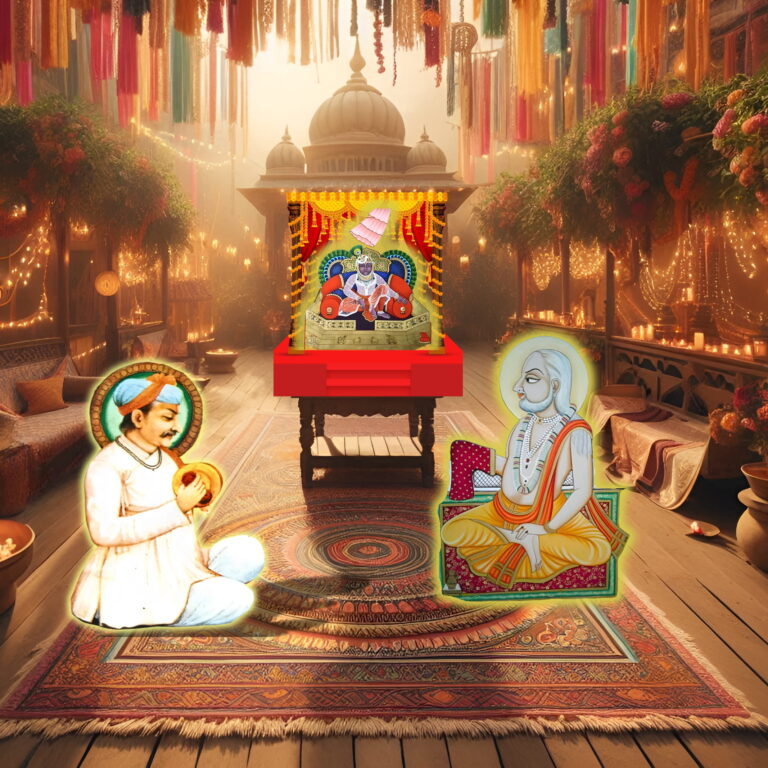
The Hymn That Opened the Eyes of a Ruler
One day, Birbal took permission from Emperor Akbar to visit Gokul for the grand celebration of Krishna Janmashtami.
Inspired by curiosity, Akbar himself decided to go to Gokul—but in disguise (changing his appearance), hidden from everyone’s eyes.
When he arrived in Gokul, the town was glowing with celebration. A huge crowd had gathered to witness the sacred cradle ceremony of (Lord) Shri Navneetpriya Ji. The air was filled with chants, devotional music, and deep devotion.
Akbar, blending into the crowd, stood quietly among the devotees. No one recognized the emperor—no one except Shri Gusain Ji, the divine spiritual leader.
At that time, Chhitaswami Ji was leading the kirtan, his voice carrying waves of devotion through the air. Meanwhile, Shri Gusain Ji was gently swinging the cradle of Shri Navneetpriya Ji.
Suddenly, Chhitaswami Ji began to sing a mystical hymn—a Pada that described a vision no ordinary eyes could see:
Chhitaswami Ji’s Divine Hymn,
Priya Navneet Paalne Jhoole Shri Vitthalnath Jhulaave Ho.
Kabahunk Aap Sang Mil Jhoolai Kabahunk Utar Jhulaavaiho.
Kabahunk Surang Khilona Lai Lai Nana-bhaanti Khilaave Ho.
Chakayi Phir Kanilevingi Tu Jhun-jhunhaat Bajaaven Ho.
Bhojan Karat Thaal Ek Jhaari Dou Mil Khaay-khavaaven Ho.
Gupt Maharas Prakat Janaave Preeti Nayi Upajaaven Ho.
Dhanyany Bhagy Daas Nijajan Ke Jin Yah Darshan Pae Ho.
Chhitaswami Giridharan Shrivitthal Nigam Ekkar Gae Ho.
As Chhitaswami Ji sang, something extraordinary happened.
A divine vision unfolded before Akbar’s eyes. He saw exactly what was being described in the hymn—(Lord) Shri Navneetpriya Ji and Shri Gusain Ji playing, swinging, feeding each other, and sharing divine love.
The crowd around him only saw the cradle being swung. But Akbar had seen much more.
Before leaving, Shri Gusain Ji secretly gave him Mahaprasad. Akbar received it with quiet reverence and returned to Agra.
The next day, Birbal also came back to Agra. The emperor, eager to talk, asked him,
“What did you see in Gokul?”
Birbal replied,
“I saw Shri Navneetpriya Ji sitting in the cradle, and Shri Gusain Ji swinging it with devotion.”
Akbar smiled and said,
“That’s not what I saw. I saw Shri Gusain Ji sitting in the cradle, and Shri Navneetpriya Ji swinging him. Shri Chhitaswami Ji sang exactly this, in his pada. I was standing near you while he sang it.”
Surprised, Birbal asked,
“Why didn’t I see that?”
Akbar calmly answered,
“You couldn’t see it because you don’t understand the true form of the Guru. You also don’t have the respect or love for your priest, Shri Chhitaswami Ji, who has such deep spiritual experience. That’s why you couldn’t have such a darshan.”
After hearing these words from Emperor Akbar, Birbal felt a deep sense of regret.
He realized that he had failed to truly recognize the greatness of Shri Chhitaswami Ji and had not placed his faith in him when he should have. Now, understanding the saint’s divine stature, Birbal silently repented for this ignorance.
Shri Chhitaswami Ji was not just a priest, but a saint so devoted and spiritually connected that even an emperor in disguise was blessed through the power of his divine pada (verse).
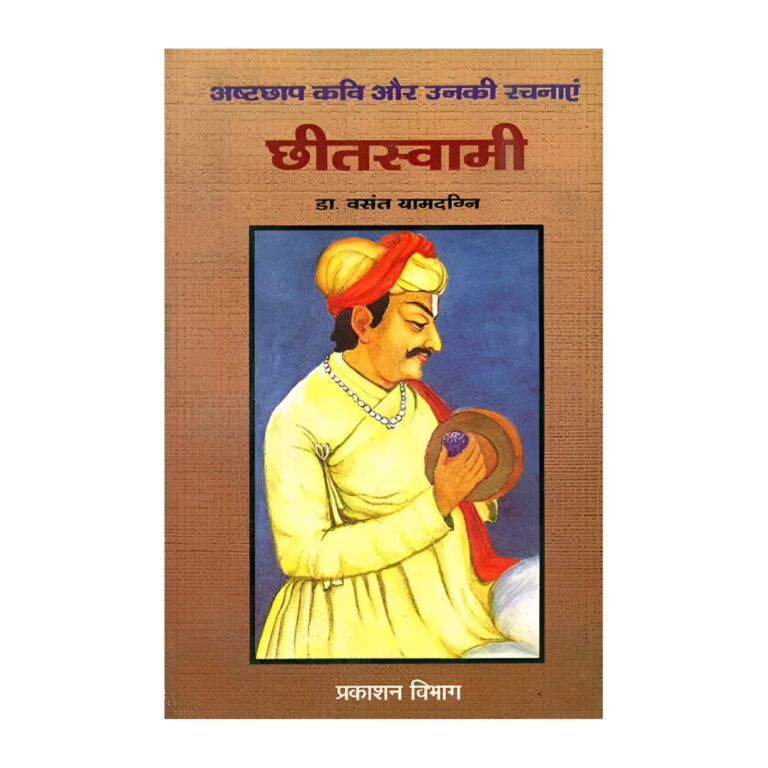
Few Verses of Shri Chhitaswami Ji
Aage Krishna, Pache Krishna, It Krishna Ut Krishna
Jit Dekhoon Tit Krishna-Mayi.
Jit Dekhoon Tit Krishna-Mayi.
Mor-Mukut Dharen, Kundal Karan Bharen
Murli Madhur Dhuni Taan Nai.
Kachhini Kachen Laal, Uparena Peet Pat
Tihi Kaal Sobha Dekhi Thakit Bhayi.
“Chit-Swami” Giridharan Shri Vitthal
Nirakhat Chhavi Ang-Ang Chhai.
– Shri Chhit Swami Ji, Shri Chhit Swami Ji Ki Vani
Essence:
Krishna is in front of me, Krishna is behind me.
Krishna is here, Krishna is there.
Wherever I look, I see only Krishna. (1)
Krishna is here, Krishna is there.
Wherever I look, I see only Krishna. (1)
He wears a crown with a peacock feather,
And beautiful earrings on his ears.
He plays sweet, ever-new tunes on his flute. (2)
And beautiful earrings on his ears.
He plays sweet, ever-new tunes on his flute. (2)
He has a cloth tied around his waist,
And wears shining yellow garments.
Just one look at him and, I am instantly captivated. (3)
And wears shining yellow garments.
Just one look at him and, I am instantly captivated. (3)
Shri Chhita Swami Ji says:
When I see Giridhar Lal, every part of him glows with beauty. (4)
When I see Giridhar Lal, every part of him glows with beauty. (4)
———-
Mohe Bharoso Shri Giriraj Ko.
Kaha Ju Bhayo Tan Man Dhan Jorain, Bhakti Bina Kaha Kaaj Ko.
Kaha Ju Bhayo Tan Man Dhan Jorain, Bhakti Bina Kaha Kaaj Ko.
Unchi Mendi Kon Kaj Ki, Braj Basivo Bhalo Chhaj Ko.
Chhitasvami Giridharan Shri Vitthal, Vallabh Kul Sirataj Ko.
– Shri Chhit Swami Ji, Shri Chhit Swami Ji Ki Vani
Essence:
I place all my faith in Shri Giriraj Ji.
Without true devotion, even if we work hard with our body and mind, and earn a lot of money, it will all be meaningless in the end. (1)
Without true devotion, even if we work hard with our body and mind, and earn a lot of money, it will all be meaningless in the end. (1)
Grand palaces are of no real value;
It is far better to live happily in a small hut in the holy land of Braj.
Shri Chhita Swami says, “Shri Vitthalnath Ji is the crown jewel of the Vallabh clan.” (2)
It is far better to live happily in a small hut in the holy land of Braj.
Shri Chhita Swami says, “Shri Vitthalnath Ji is the crown jewel of the Vallabh clan.” (2)
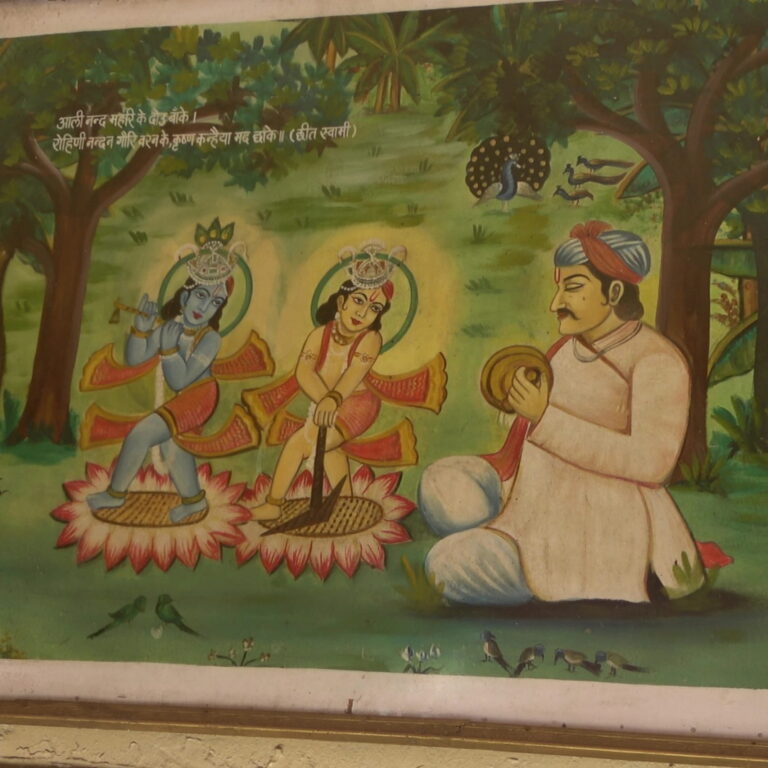
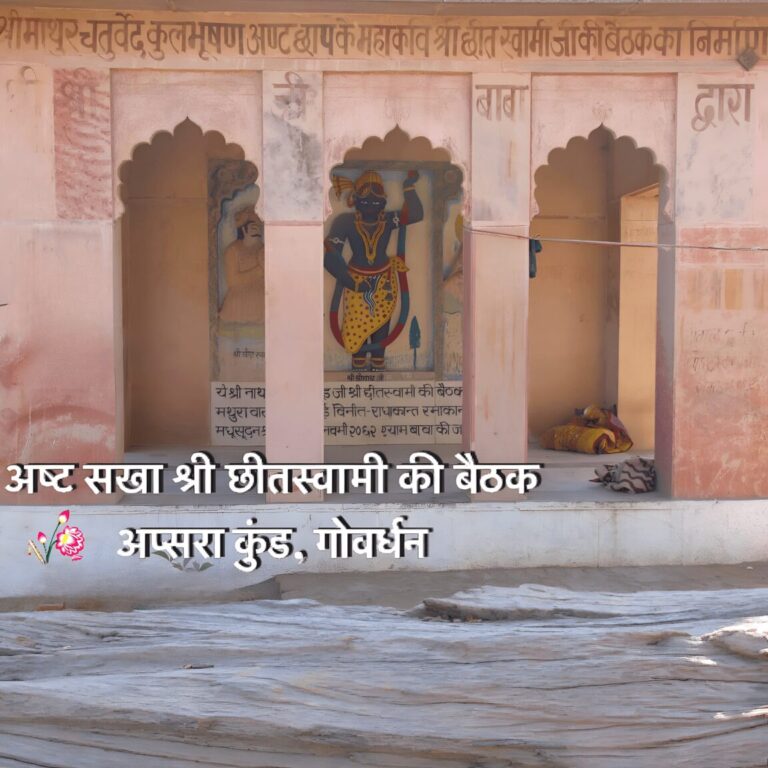
To the Divine Abode (Bhagwad-dham ghaman)
In the sacred year of 1585, near the divine Govardhan Hill, in Poonchhri, Shri Chhitaswami Ji, the beloved devotee and poet of the Lord, gently left his mortal body.
With a heart full of devotion and a soul drenched in divine love, he ascended into the supreme abode of Shri Krishna.
Even today, centuries later, his spirit continues to live on. In the hearts of those who walk the path of bhakti, the voice of Shri Chhitaswami Ji still sings. His sacred padas (devotional songs) carry timeless messages—of unconditional love, complete surrender, and the grace that flows from true devotion.
